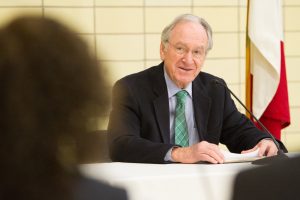Senate Hearing at DMPS Focuses on Early Childhood Education Access

U.S. Senator Tom Harkin presides over a congressional hearing on early childhood education at the Mitchell Education Center.
Yesterday U.S. Senator Tom Harkin was at Camp Dodge, bestowing some overdue medals on soldiers who earned them long ago. This morning, at the Mitchell Education Center, he presided over a hearing about the importance of expanding access to early childhood education. From repairing the past to preparing the future, overnight.
One of the officials providing testimony for the record at “Doing What’s Right: Preparing Iowa’s Children for Success in School and Beyond,” was Susie Guest, the DMPS Director of Early Childhood Programs.
Field hearings are one of the ways that Senator Harkin seeks to marshal support for preschool legislation he’s introduced as the Chairman of the Senate Health, Education, Labor and Pensions Committee and an Appropriations Subcommittee.
The testimony of Guest and other expert witnesses is critical in painting a full and accurate picture of where DMPS, this state, and the nation stand in the effort to fulfill the American promise of equal access to quality public education. Harkin’s bill would boost funding for Pre-K programs serving low income families and enhance other services that support them and their preschool aged children.
“In our last hearing one of the witnesses reported that 90% of the children of parents in the top 20% of earners have access to preschool,” Harkin said in his opening remarks. “Only 65% of children in the bottom 40% receive preschool instruction. That disparity in access is simply unacceptable.”
Guest’s testimony cited some of the raw statistics pertinent to the DMPS preschool program:
- Roughly 2,000 of the 32,000 students in the district are preschoolers.
- DMPS preschool provides 13 hours per week of certified instruction, more than the state-mandated minimum of 10.
- 16% of DMPS families are non-English speaking households.
- Only about half of the eligible kids in the district are currently being served.
But her real emphasis was on what needs to be addressed by any legislation aimed at making Pre-K education truly universal.
“Community engagement is the key element in maximizing participation,” Guest said. “We scramble for grants from community agencies to fund social workers and home visits that augment the actual instruction we provide at our sites. Policies to improve access and target at-risk children and their families need to be part of the legislation.”
Also testifying was State Senator Herman Quirmbach from Ames who chairs the Education Committee of the Iowa Senate. He noted the cruel irony that currently those children who research demonstrates profit most from quality Pre-K instruction are the least likely to receive it. While 90% of Iowa’s school districts offer preschool services, only 65% of the state’s four year-olds are being served. In Des Moines, the state’s largest district, 70% of students qualify for free-and-reduced-price meals, the leading indicator of poverty. Quirmbach is trying to pass a measure that would boost the state’s per-pupil funding for preschoolers in districts that increase their Pre-K enrollments over the next three years.
Testimony at the hearing focused not only on getting more kids into preschool but keeping them there longer once they’re enrolled. Research also clearly suggests that full-day programs produce better outcomes than half-day ones, especially when they’re staffed by properly trained and fairly paid teachers. And full-day programs are more logistically family-friendly besides delivering more instruction, particularly in states like Iowa where the incidence of households where both parents work fulltime is high.
Harkin is hopeful of advancing his federal legislation later this spring with the help of ammunition he amasses at public hearings like the one this morning at Mitchell.
“I intend to pass this bill out of my committee before Memorial Day,” he declared.
That’s when a lot of graduation ceremonies will be going on. The formal word for them is commencement, which means a beginning. And there’s no better place to begin for the Class of, let’s see, 2028, than Harkin’s Strong Start for America’s Children Act.




